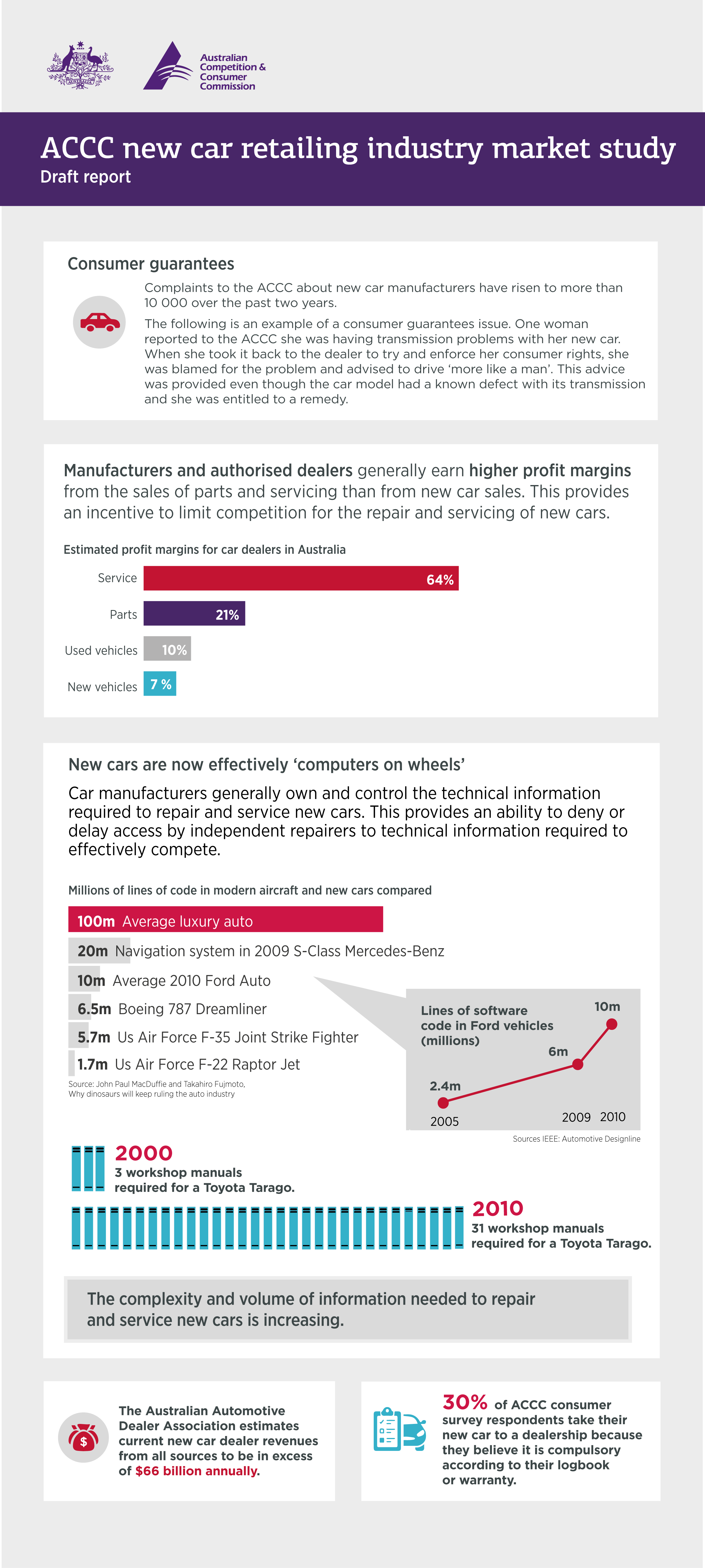The ACCC today released the draft report of its market study into Australia’s new car retailing industry.
“Complaints to the ACCC about new car manufacturers have risen to more than 10,000 over the past two years. Our draft report highlights the urgent need to address widespread issues in the industry,” ACCC Chairman Rod Sims said.
Three key observations from this market study are:
- car manufacturers’ complaints handling systems and policies are preventing consumers from obtaining the remedies to which they are entitled under the Australian Consumer Law (ACL)
- a mandatory scheme should be introduced for car manufacturers to share technical information with independent repairers
- buyers of new cars need more accurate information about new cars’ fuel consumption and emissions.
Non-compliance with the Australian Consumer Law

“The ACCC is deeply concerned about the level of non-compliance with the Australian Consumer Law in the new car industry. We will continue to take action to address failures by car manufacturers and retailers to provide the remedies to which consumers are entitled,” Mr Sims said.
The ACCC found that many car manufacturers have not factored consumer guarantee rights into their complaints handling systems and new car buyers are losing out as a result. These rights provide remedies for consumers if their new car experiences a failure, including a right to a repair (without charge) for a minor failure, or a replacement of the car or a full refund for a major failure.
The ACCC has identified five key issues contributing to the difficulties consumers are having enforcing their consumer guarantee rights:
- car manufacturers’ focus on warranty obligations to the exclusion of their consumer guarantee obligations
- there is a dominant ‘culture of repair’ underpinning car manufacturers’ systems and policies for dealing with car defects and failures
- the widespread use of non-disclosure agreements by car manufacturers when resolving complaints
- the lack of effective independent dispute resolution options for consumers
- particular features of the commercial arrangements between car manufacturers and dealers.
“The ACCC supports recommendations in the recent consumer law review to address uncertainties and strengthen the application of consumer guarantee rights. These proposed changes would entitle consumers to get a refund or replacement within a set period of time if their new car doesn’t work. They would also clarify that multiple non-major failures can amount to a major failure and also require that there be clearer disclosure to consumers in relation to warranties,” Mr Sims said.
“We will work with car manufacturers and dealers to develop easy guidelines which should be provided to consumers when they buy a new car so they are better informed.”
The ACCC is also concerned about other potential ACL compliance issues in the new car retailing industry. This includes statements provided in logbooks and service manuals prepared by some car manufacturers that are likely to mislead new car buyers about their consumer guarantees when it comes to servicing and repairing their car.
Sharing of technical information
The ACCC found problems with the detail and timeliness of technical information given to independent repairers. This is despite a voluntary commitment made by car manufacturers in 2014 to provide independent repairers with the same information to repair and service new cars that they provide to their authorised dealers.
There are barriers in the industry preventing access to this technical information, which impacts competition in the repair and servicing of new cars. The repair and servicing sector was worth a combined $24.8 billion in 2016-17 and dealers have an average 64 per cent profit margin on new cars they service.
“Car manufacturers should be required to share new cars’ technical information with independent repairers. For new cars to be properly repaired and serviced, independent repairers need access to electronic information and data produced by car manufacturers,” Mr Sims said.
“This lack of competition hurts new car buyers who have fewer options to get the best deal for repairs and servicing, and restricts independent repairers from competing on a level playing field.”
Fuel consumption and emissions performance figures
The ACCC also found that consumers are not receiving accurate information about the fuel consumption or emissions performance of new cars.
“Fuel consumption and emissions are often major purchasing factors for buyers when choosing their new car. We’re concerned that what new car buyers are told their car will achieve is very different from practice,” Mr Sims said.
Research from the Australian Automobile Association indicates that real-world fuel consumption is on average 25 per cent higher than official laboratory test results that are provided on mandatory vehicle labels.
“Car manufacturers and dealers must ensure the representations to consumers about fuel consumption and emissions are accurate and appropriately qualified. We also support introducing more realistic laboratory tests and an on-road ‘real driving emissions’ test to give people more accurate information before they buy,” Mr Sims said.
The ACCC is seeking comments on the draft report by 7 September 2017. The ACCC expects to release a final report in late 2017. Brief summaries of the draft report for consumers and independent repairers are also available on the ACCC’s website.
Notes to editors
The ACCC has taken action involving numerous manufacturers in the motor vehicle industry, recently including Ford, Holden, VW and Audi.



